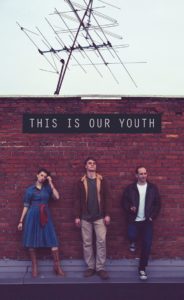
Promotional image depicting college dropouts Dennis (played by Silas Waugh) and Warren (played by Adam King) discuss their plight with Jessica (played by Kelly McCarty) in a scene from the production of “This Is Our Youth,” being presented Feb. 3-5 by Western Carolina University’s School of Stage and Screen. Photo found on Stage & Screen at WCU’s Facebook.
Western Carolina University’s Stage & Screen finished up their showing of “This Is Our Youth” on Feb. 5 in Bardo Arts Center, striking home the all too familiar concept of leaving the nest into a more complicated world than we started in.
“(The show) was uncomfortably human, uncomfortably relatable, and real,” mentioned Holly Hurding-Jones, junior at Western. “It felt like I was watching legitimate people talk about their issues. Any one of my friends could have been any one of those characters.”
“This Is Our Youth” was written in a conversational style, flowing from topic to topic seamlessly as if it were between real, authentic people and not a rehearsed script. In a post-show discussion, the actors mentioned that they weren’t held too tightly to the script, improvising to add to this effect.
The characters came across as genuine as they battled their own damaged selves and images as they tried to make more sense of who they were and stand up for themselves not only to their parents, but to each other.
The set was minimalist and yet functional, open for the audience to see on all four sides. The story took place all in one bedroom apartment in the ‘80s, plastered with polaroids and posters. It’s as cleanly as you expect a stereotypical college freshman’s dorm room to be, with clothes scattered here and a crushed can there. An impressive feat of the set was that there was working sink for water, making the feel of the set that much more immersive. Plus, the accentuation of the pastel colored coats and costumes and vinyl records setting the mood of scenes helped cement the audience that they were in 1982.

Promo image. From left to right, Kelly McCarty, Adam King, Silas Waugh. Photo from Stage & Screen at WCU Facebook page.
Kelly McCarty played Jessica, a socially outward political young woman of the ‘80s who was self-conscious and unsure of herself, assuming she’s usually always wrong but doesn’t want to be. Seeing her physically react and change her mind through the plot made her performance dynamically attention grabbing.
Adam King was flawless in portraying unbearable cringe of his character, Warren. His intentionally put on inexperience and immaturity made the audience groan and bury their faces in their hands but kept them interested in his plight.
Silas Waugh as Dennis became a fuming hothead at the drop of a hat, insulting up a storm to anyone he came across, with a façade of how he couldn’t be seen as weak to anyone. In the second act, his freaked out monologue about all he could be when faced with death is a starring moment.
The story of the show featured three college age characters as they struggle with each other during personal conflicts at their differing pivotal points of being thrust into a harsh adulthood. They clash and collide and try to fix things with each other as well as their parents as they try to figure out their complex, and slightly messed up lives.
(For a more detailed description of the story, read this.)
Many audience members had strong reactions to the show, glancing at friends when certain events happened and nodding as if the scenes depicted were similar to things that happened in their lives.
“My friend and I graduated in May, and we’re watching this show and looking at each other, we’re like that’s us, y’know? Dancing in the apartment, not knowing what the f$#& we’re doing…” commented Jesse Allard, WCU alumni. “It’s kind of scary because this was kind of written as a look back on what it is to be a 20 something, so it’s a little scary to be like, who am I going to be in my 30s and I look back at this (play) and think these were the good old days? Will I give up on my dream, will I be strung out?”



